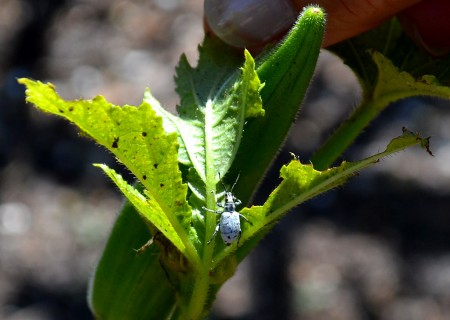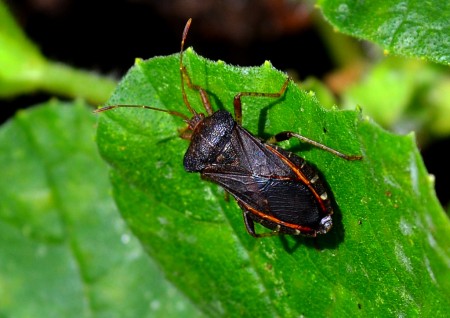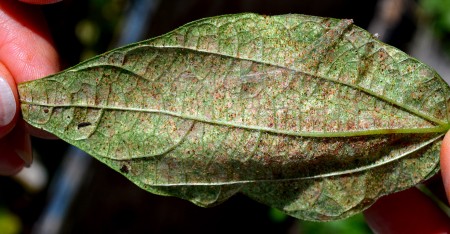Geez, Loo-eeze! Three more insects, intent on destroying my garden, have appeared. All of a sudden, there are way too many critters that want to eat what I want to eat.
Sri Lanka Weevil
Okra used to be the most reliable and hardy plant in my garden. Over the years, my plants produced enough okra to have it several times a week. It was always the last to give up to the Florida summer in July, and it was not bothered by pests. Not so this year. I now have an infestation of Sri Lanka weevils. (Click on any picture to make it larger.)
Upon researching this insect with the University of Florida IFAS Extension, I found that its larvae are root feeders, but they are very difficult to detect. The adults are gray, about 1/4 inch long and feed on the foliage of host plants. In my case, they also chewed the new buds on my okra. Besides okra, they will munch notches in the leaves of just about anything including tropical fruit trees, palms and citrus. They are particularly fond of mangos and lychees.
Insecticides with carbaryl (Sevin) are recommended for control. I have used Sevin before, but not for a couple of years. Even though it is near the end of the growing season in south Florida, and a lot of the okra is in shreds, I did sprinkle some Sevin on what was left and on the ground. Hopefully, it will kill the weevils and keep them from moving on to the other plants in my yard. I have some very young avocado trees I want to protect.
Squash Bugs
The acorn squash I planted is growing so well. It looks very healthy and is flowering like crazy. I had no issues with it until I found a squash bug on a squash leaf. They will eat the plant, but they do not cause disease on the plants.
Squash bugs have piercing and sucking mouth parts. They suck the sap out of the leaves and stems and disrupt the flow of water and nutrients. Large, healthy plants generally do not suffer from the feeding, but young plants can die if there are very many squash bugs snacking on them. Luckily, they aren’t as destructive to plants at the mature stage of growth that mine are, and no treatment is necessary.
I found some really good information on squash bugs on the University of Minnesota‘s website.
Red Mites
Green beans are a staple for me. I love them and they are easy to grow. I’ve never had any issues with insects on green beans. (Where have you heard that before?)
Suddenly, the leaves were turning a mottled green and yellow and the underside was covered with red fuzz.
 The ‘red fuzz’ turned out to be red spider mites. Looking really closely at the back of the leaf, I could see them moving. Once they start, they move quickly through a garden of plants.
The ‘red fuzz’ turned out to be red spider mites. Looking really closely at the back of the leaf, I could see them moving. Once they start, they move quickly through a garden of plants.
Red spider mites are hard to control, so prevention is suggested rather than controlling an infestation later. According to various sources, red spider mites do not like damp conditions, so keeping the plants’ leaves wet is helpful. Considering that this has been the wettest ‘dry season’ in south Florida in many years, I am not sure that is good advice… or at least, wet did not work for me.
If there is an infestation, the recommended means of control is to spray the plants with liquid dish detergent in water, paying particular attention to the bottoms of the leaves where the mites are. There are several stages of life cycles going on all at the same time, so spraying must be done every four days for three weeks. I’ve heard that Neem Oil is effective also.
I’m So-o-o Over The Pest Thing
My garden has been hard hit by pests this season, and considering that it is very near the end of the growing season in Florida, I am not going to do much more about any of them. I will do what I can for the acorn squash and the remaining okra plants, but I’m pretty well finished with everything else.
Tags: Acorn Squash · garden pests · Green Beans · Okra · Raised Garden · Red Mites · Squash Bugs · Sri Lanka Weevil3 Comments

Well now. Might as well blame them all on “global swarming”
🙂
So, you are saying my garden has been ‘Gore -ed’. So funny!
I planted two batches of okra last year and had okra all summer and fall until I pulled the plants up New Year’s Day! We had a few cold fronts and I was surprised they kept flowering through December. I’m in a dry inland part of central Florida. My brother is in wetter south Florida. He grows exotic fruit, doesn’t like to deal with veggies and bugs (I have lots of veggies, herbs, and beneficial flowers). We have the leaf notcher weevils too, but not as bad as south Florida.